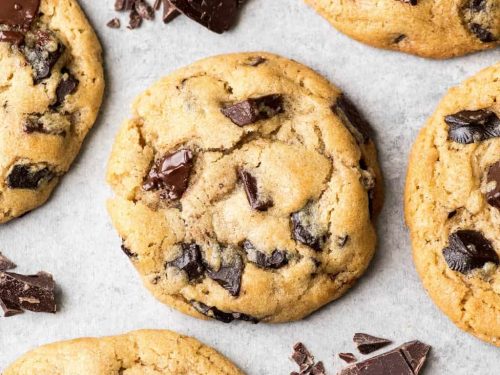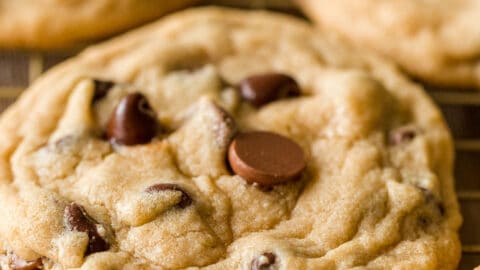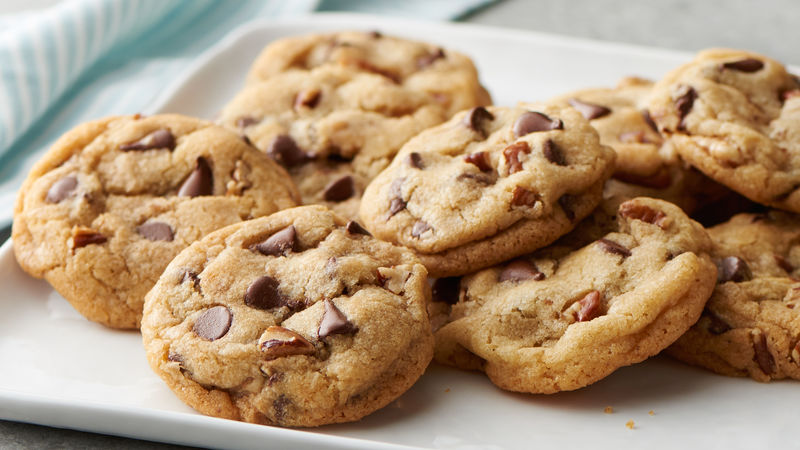Cookies are one of the most common snacks that are found in our homes. People of all age groups love to eat munch on cookies any time during the day. Cookies can be plain or have different flavorings like chocolate, chocolate chips, nuts, dry fruits, and fruits. The basic cookies are usually made from flour, butter, and sugar. While the sweetness of these cookies melts in your mouths, taking you to another world, you have to remember that these are sinful treats that should be consumed in very small quantities.
Is your cat licking its tongue when seeing you enjoying the cookies? Does it have a sense of longing in its eyes? Well, we wouldn’t blame you if you are tempted to feed cookies to your cats, as you can’t resist falling to their charms. However, please note you shouldn’t feed too many cookies to your cats, as they contain ingredients that are toxic to cats.
If your cats nibble on one or two pieces of cookies occasionally, they may not fall sick. However, when cats consume too many cookies over a prolonged period, they suffer from digestive issues, nausea, diarrhea, and lethargy. Also, some of the flavorings in cookies are too dangerous for cats. Please keep reading to know more about the health risks posed by cookies to your feline friends.
Unsafe ingredients used for cookies

One of the most popular cookies that everyone loves today is the simple chocolate chip cookies. You can make them easily at home, especially if you have kids at home. Homemade cookies are healthier and tastier than store-bought cookies. Your kids will ask you to make them often, once they have a taste of these cookies. However, please remember to keep your felines away from these cookies, even if they are homemade, as they contain ingredients that cats cannot digest well.
The common ingredients used in making chocolate chip cookies are:
- Butter – Not safe for cats, as most adult cats are lactose intolerant
- Sugar – Not safe for cats, and the felines can’t even realize the taste of sugary foods
- Eggs – Neither safe nor toxic for cats; however, cats don’t need the proteins that eggs contain, as they draw enough proteins from their normal meat and seafood-based foods and treats
- Vanilla Extract – Too toxic for cats
- Baking Soda – neither safe nor toxic for cats
- Salt – Toxic for cats, when consumed in large quantities
- All-purpose flour – Not safe for cats, when consumed in large quantities
- Chocolate chips – toxic for cats
- Walnuts, or any other nuts – Not safe for cats
Why do these ingredients cause health hazards to cats?
As you can see above, most of the ingredients used in cookies are toxic or unsafe for cats. So, these should explain why you need to keep your feline friends far away from cookies. Now, let us look into the details of these ingredients to know what type of health risks they pose to the cats.
Butter
Most adult cats (those aged above 2 months) are lactose intolerant. Their bodies don’t have the enzymes to digest the lactose component in milk and other dairy products. Cookies contain a lot of butter; therefore, feeding these cats can impact their digestive system severely. Nausea, diarrhea, vomiting, and stomach ache are some symptoms that cats exhibit when given foods rich in dairy products.
Sugar
White sugar or brown sugar is used for making cookies. Even if cookies are made with the most natural form of sugar, you cannot give them to cats. This is because sugar contains a lot of fat. When cats consume a lot of sugary cookies over a long period, they tend to put on weight. Feline obesity can further lead to other serious health issues, like increased heart rate, increased blood pressure, kidney damage, lethargy, etc.
Eggs
Cooked eggs are not too bad for cats, but you can feed them eggs in other formats. Cookies are not the right food to give eggs to our cats.
Vanilla Extract

This ingredient is highly toxic for cats. A small amount of vanilla extract is believed to contain some alcohol. Foods containing alcohol can bring about serious health hazards for cats. Overconsumption of these foods can lead to nerve damage and fatal brain damage in cats.
Salt
When cats eat too many salt-rich cookies, they feel excess thirst. However, they don’t drink water even if they feel thirsty. As a result, they feel dehydrated, leading to lethargy and weakness. Overconsumption of salt leads to a condition known as salt toxicity of sodium poisoning. It leads to fluid buildup in the legs of the cats, and can also lead to kidney damage, in severe cases.
All-purpose flour
While flour is not exactly toxic for cats, it is recommended that you don’t feed them flour-based items. This is because the digestive system of cats is very different from that of humans. So, they cannot digest the grains properly and can cause gastrointestinal issues in felines.
Chocolate chips
Chocolate is one of the most dangerous foods for cats. It contains theobromine and caffeine, both of which are toxic for cats. Overconsumption of theobromine can cause nerve damage, seizures, tremors, and coma in cats.
Can cats eat plain cookies without additional flavors of chocolate?
No, you still cannot feed cookies to cats, even if they don’t contain chocolate chips. As you can see from the above list, even plain cookies contain some ingredients like butter, sugar, and other artificial sweeteners, which are toxic to cats. Your veterinarian will tell you never to feed cookies to your cats, even as treats.
Final Word
Cookies don’t contain any nutritional value that cats can benefit from. To add to the miseries, they are also made up of many toxic ingredients that can upset a cat’s sensitive digestive system. Since most cats are lactose intolerant, we wouldn’t want you to risk their health by feeding cookies or any other item that has milk or milk products as one of its ingredients.
